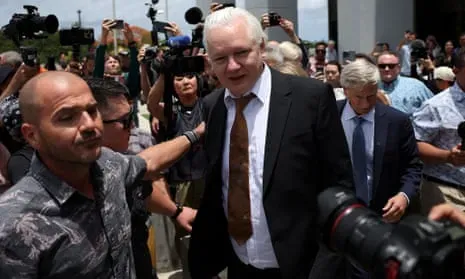WIKILEAKS’ JULIAN ASSANGE LANDS IN AUSTRALIA AFTER PLEA DEAL- Now we have to clear his name!
Australians waited for Julian Assange’s chartered plane to arrive on home soil with a mixture of joy and relief on Wednesday afternoon as politicians across party lines welcomed what they said was his long-overdue release and Assange’s ardent supporters celebrated his freedom.
A small crowd gathered outside the U.S. Consulate in Sydney, drinking champagne from plastic cups and holding signs featuring the WikiLeaks founder, who was a free man after pleading guilty to one charge of violating the Espionage Act and being sentenced to time served.
But none were happier than Assange’s relatives, many of whom have not seen the WikiLeaks founder in almost 15 years. Assange’s father, John Shipton, told local media he was “doing cartwheels” of joy, while his mother, Christine Assange, said the saga had “taken a toll on me as a mother.”
Assange’s wife, Stella, and their two sons, aged 5 and 7, also traveled here from their home in London — the boys unaware that they are about to see their father outside a prison for the first time.
The deal was the result of two years of behind-the-scenes exhortations from Australian Prime Minister Anthony Albanese, who had privately and publicly urged President Biden to allow Assange’s release.
Amid the emotions, however, were worries over what Assange’s plea deal — entered during a brief morning pit stop in the Northern Mariana Islands, a U.S. territory — means for press freedom, around the world and in Australia, a nation where journalists and whistleblowers have endured setbacks recently.
Assange maintained in court Wednesday that he was a journalist and that he thought what he was doing, in publishing an avalanche of classified U.S. government information, was protected by the First Amendment, contending that the right to free speech contradicted the Espionage Act.
While Australians have long supported Assange, who grew up here before launching WikiLeaks in 2006 and becoming internationally famous in 2010 after publishing files about the wars in Iraq and Afghanistan, the United States prosecution fed into fears some have in Australia over the deepening ties between the two nations.
Canberra and Washington have grown increasingly close in recent years, brought together by concern at China’s growing aggression in the region, with Australia agreeing to host a rotating force of U.S. Marines in Darwin and more recently forming the “AUKUS” pact with the United Kingdom. The United States has agreed to provide its ally with nuclear-powered submarines and increase military interoperability, sparking concerns here that Australia could be drawn into a future conflict.


